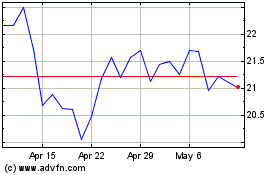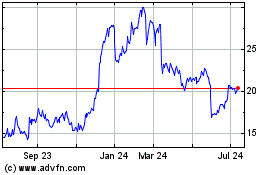Verizon, for First Time, Loses Core Wireless Customers -- Update
April 20 2017 - 10:51AM
Dow Jones News
By Ryan Knutson and Joshua Jamerson
Verizon Communications Inc., once the untouchable leader of the
U.S. wireless industry, is struggling to hold onto customers and
getting them to pay a premium for its service.
The carrier posted its first ever quarterly net loss of wireless
subscribers during the first three months of 2017, showing the
extent of the damage resurgent rivals T-Mobile US Inc. and Sprint
Corp. have inflicted on the nation's largest carrier by
subscribers.
Verizon unexpectedly brought back unlimited data plans in
February, which it had stopped selling in 2011, seeking to blunt
the appeal of similar offers from T-Mobile and Sprint. That offer
hit financials: Verizon had a 5.1% decline in revenue in its
wireless business, to $20.9 billion.
The results will put pressure on Verizon's management to either
find a way to turn things around or make moves that will diversify
the company away from the wireless business, where most Americans
already have a smartphone and price wars have pinched profits.
Rival AT&T Inc. has diversified with its acquisition of
DirecTV and proposed purchase of media giant Time Warner Inc. But
Verizon doubled down in 2014 with its $130 billion purchase of
Vodafone Group PLC's 45% stake in their Verizon Wireless joint
venture.
Since then, Verizon has spent more than $10 billion on smaller
deals like AOL and Yahoo Inc., but neither deal is enough to move
the needle. The company has also explored bigger transactions,
including with Charter Communications Inc., the Journal has
reported, though executives have recently signaled the two sides
are far apart.
"We're confident in executing our strategy organically, but if
there's the right opportunity out there to accelerate the strategy
inorganically in a way that adds shareholder value, we're always
looking at those opportunities," Verizon Chief Financial Officer
Matt Ellis said on a call with analysts.
More Verizon customers used the unlimited plan to reduce their
bills -- moving from expensive data plans to the cheaper unlimited
one -- than customers chose to pay up. Average revenue per account,
including device payments, increased by only $1, to $166 from $165
in the year-ago period.
The introduction of unlimited plans, along with a "safety mode"
feature launched last year, also chipped away at lucrative
"overage" revenue, which comes from the fees Verizon charges when
customers exceed their monthly data limits.
Much of the pain Verizon is going through began as a result of
moves T-Mobile began making in 2013, such as ending two-year
contracts and canceling overage fees. John Legere, T-Mobile's brash
chief executive, mocked Verizon's results on Twitter. T-Mobile and
AT&T are slated to report their latest quarterly results in the
coming weeks.
The company's revenue and profit came in less than Wall Street
was expecting. The stock, already down 8.3% so far this year, fell
another 2% to $48.03 in early Thursday trading.
Verizon said Thursday the unlimited data plan "positively
changed the trajectory of customer additions" in the quarter, but
it still reported a net decline of 307,000 retail postpaid
connections during the first three months of the year, including
289,000 phone losses. That compares with 640,000 retail postpaid
net additions in the year-ago period, including 8,000 phone
losses.
Before the launch of its "Verizon Unlimited" plans in
mid-February, Verizon had a retail postpaid phone net loss of
398,000; after the launch, Verizon said it added 109,000 retail
postpaid phone connections.
Verizon's decision in recent years to give away free tablets as
a way to juice subscriber numbers is also coming back to haunt it,
as many of the customers who signed up for two-year data plans in
exchange for a free tablet aren't renewing their subscriptions.
Verizon expects improvement in wireless service revenue this
year, with total revenue "fairly consistent" with 2016. But that
stands to leave Verizon in a familiar position: slowing growth on
the top and bottom lines, and a sliding stock price.
Overall, for the March quarter, Verizon reported net income of
$3.45 billion, or 84 cents a share, compared with $4.31 billion, or
$1.06 a share, in the year-ago period. Excluding certain items,
Verizon earned 95 cents a share. Total revenue, which includes the
wireline segment and FiOS service, fell 7.3% to $29.8 billion.
Analysts polled by Thomson Reuters expected per-share profit of
96 cents on $30.5 billion in revenue.
Write to Ryan Knutson at ryan.knutson@wsj.com and Joshua
Jamerson at joshua.jamerson@wsj.com
(END) Dow Jones Newswires
April 20, 2017 10:36 ET (14:36 GMT)
Copyright (c) 2017 Dow Jones & Company, Inc.
SentinelOne (NYSE:S)
Historical Stock Chart
From Mar 2024 to Apr 2024

SentinelOne (NYSE:S)
Historical Stock Chart
From Apr 2023 to Apr 2024
